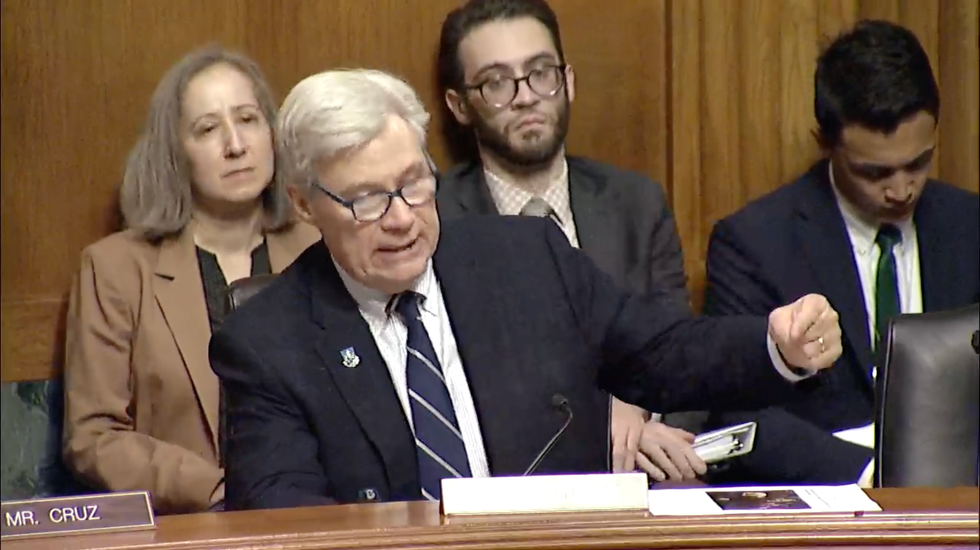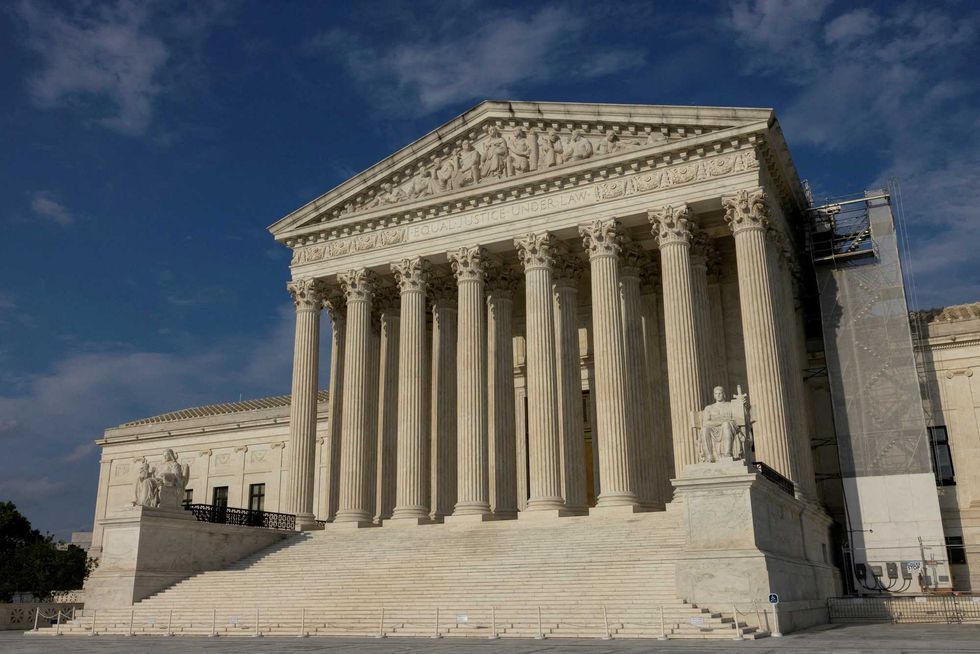Ted Cruz slammed over GOP ‘effort to demonize’ federal judges in time of rising threats
Government watchdogs and legal experts warned that Republicans’ call for the impeachment of two federal judges at a Senate judiciary committee hearing this week upends historical norms and sets a dangerous tone of intimidation.
Led by Sen. Ted Cruz (R-TX), Wednesday’s hearing, Impeachment: Holding Rogue Judges Accountable, was a nearly three-hour partisan battle on the merits of impeaching James “Jeb” Boasberg, chief judge of the U.S. Court for the District of Columbia, and Deborah Boardman, district judge for the U.S. Court of the District of Maryland.
Only 15 federal judges have ever been impeached by the House of Representatives, and only eight removed by the Senate.
Nonetheless, Republicans claim Boasberg is biased against President Donald Trump and his administration and accused Boardman of letting a defendant’s gender identity factor influence what they say is a lenient sentencing of an attempted assassin of conservative Supreme Court Justice Brett Kavanaugh.
“The whole idea that we have a bunch of rogue judges out there just strikes me as not worthy of credence,” said Jonathan L. Entin, a professor emeritus of law at Case Western Reserve University.
“It's a slogan. It's something you put on social media for your 15 minutes or 15 seconds of fame.”
Jay Young, senior policy director for civil rights and civil liberties at Common Cause, a nonpartisan government reform group, said Cruz’s hearing was “an effort to demonize” the judges and “prove a political point.”
“This effort to mischaracterize opinions that you don't believe, you don't agree with, it just feels so dangerous right now,” Young said.
In a June 2024 National Judicial College survey, more than half of judges reported threats to their safety.
“The whole reason why impeaching judges for their rulings, specifically, hasn't been done is to prevent intimidation,” said David Janovsky, acting director of The Constitution Project at the Project On Government Oversight, an independent watchdog.
“This is certainly a moment where there are plenty of threats to judicial independence and integrity, and so crossing a line that hasn't been crossed to go after judges in this moment seems misguided.”
Some judges who have ruled against Trump reported intimidation and doxxing.
“The idea that supposedly responsible federal officials are talking about impeaching judges, for which there's no justification and no real prospect, can't improve the situation,” Entin said.
“If you're a federal judge, and you see something like this, your hair is going to stand on end. This is not appropriate behavior. It's not responsible behavior.”
‘Railing against judges’
Going back to Marbury v. Madison, the 1803 landmark U.S. Supreme Court case which instituted the principle of judicial review, there has been a “well-established tradition in the United States that you don't impeach judges because they make rulings with which you disagree,” Entin said.
“You don't run them off the bench.”
Even the attorney for Anthony Burns, a fugitive slave whose 1854 trial led to outrage when a judge sent him back to slavery, was “the strongest opponent of removing the judge,” Entin said.
“There is a history of people railing against judges saying that ‘They're wrong. They're either tools of the establishment making rulings that oppress workers and consumers, or maybe they’re wild-eyed radicals who are trying to subvert the rule of law,’” Entin said.
“The standard can't be, ‘I'm mad because I lost, therefore this judge is corrupt or incompetent and should be removed from office.’”
‘Wrong-headed’
The Trump administration has railed against Boasberg for decisions including his order in early 2025 to halt deportation flights headed to El Salvador under the Alien Enemies Act — an order that was defied, presenting probable grounds to hold officials in criminal contempt.
“All of this looks very much like a MAGA-coordinated strategy to bring pressure and threats to bear on a federal judge,” said Sen. Sheldon Whitehouse (D-RI) during Wednesday’s hearing.
 Sen. Sheldon Whitehouse (D-RI) at Wednesday's hearing. Picture: Screengrab
Sen. Sheldon Whitehouse (D-RI) at Wednesday's hearing. Picture: Screengrab
Whitehouse described “an environment in which violent threats are prevalent and in which MAGA DOJ repeatedly refuses to assure us that proper investigative practices are being followed with regard to such threats.
“Presumably, the purpose is to scare Judge Boasberg off or block him from examining contempt of court by MAGA’s Department of Justice.”
Boasberg also presided over several cases related to the Jan. 6, 2021 attack on the U.S. Capitol, when rioters attempted to block certification of President Joe Biden’s victory over Donald Trump in 2020.
During Wednesday’s hearing, Republicans repeatedly pointed to Boasberg’s authorization of non-disclosure requests for telephone toll records related to Special Counsel Jack Smith’s investigation of Trump’s attempts to overturn the 2020 election.
Cruz said: “He knew that Jack Smith was a partisan Democrat engaged in an effort to go after Donald Trump, that he was subpoenaing over 400 Republicans, so the one thing he knew is all of these targets were Republicans.
“The only conceivable basis for Judge Boasberg signing these orders one after the other, is an animus that says every Republican on Planet Earth, every American who voted for Donald Trump, there is reasonable basis to believe they are criminals.”
Whitehouse pushed back on Cruz’s comparison of Boasberg to “a partisan hack” as grounds for impeachment.
“MAGA faults Chief Judge Boasberg because it was Republican senators whose records came up, but that's investigation 101,” Whitehouse said during the hearing.
“People under investigation had called senators. That's why senators’ toll records came up in the investigation. As Jack Smith testified, he did not choose those members. President Trump did.”
When Whitehouse suggested Boasberg approved the telephone subpoenas due to “foreseeable misconduct by Donald Trump and his co-conspirators,” Cruz chalked up the argument to “a longer version of ‘orange man bad.’”
Entin said: “The whole rationale behind this, that you have to impeach judges who make controversial rules, is just wrong-headed. It fundamentally undermines the rule of law.
“Some judges are good, some judges are bad, but we have never, that I know of, impeached federal judges for their rulings.”
‘Quixotic quest’
In the case of Boardman, the Maryland district judge, the DOJ is appealing her eight-year prison sentence for Sophie Roske, charged as Nicholas John Roske, for attempting to assassinate Kavanaugh.
The DOJ sought a sentence of 30 years to life. Throughout the hearing, Cruz emphasized that Roske is transgender and called Boardman’s sentencing “a gross dereliction of duty.”
“It's pretty rich for conservatives to be complaining that the person who stalked Justice Kavanaugh got only eight years for that when President Trump has pardoned 1,500 people who tried to subvert the 2020 presidential election,” Entin said.
Entin said Cruz “should know better” than to push for impeachment of judges on such grounds, given his background as a Harvard Law graduate, Supreme Court clerk and former Solicitor General of Texas
Even in an election year, “it’s wrong for him to pull in stunts like this,” Entin said.
“He knows better than to go off on this kind of quixotic quest.
“Especially he knows better because he knows that it's not just Justice Kavanaugh, by the way, who has faced threats. Some judges have been murdered. Some judges have had family members murdered by people who couldn't get to the judge but could get to the family member.”
Cruz wrote a Jan. 7 letter to House Speaker Mike Johnson (R-LA) encouraging him to advance articles of impeachment against Boasberg and Boardman, but either being removed with a two-thirds Senate vote remains unlikely, Entin said.
“Given a closely divided and highly polarized Senate, it is virtually inconceivable that a judge would actually be removed from the bench because of a controversial ruling,” Entin said.
“It has never happened in our history.”



 Seth Chandler (Photo credit: University of Houston Law Center)
Seth Chandler (Photo credit: University of Houston Law Center) FILE PHOTO: A view of the U.S. Supreme Court in Washington, U.S. June 29, 2024. REUTERS/Kevin Mohatt/File Photo
FILE PHOTO: A view of the U.S. Supreme Court in Washington, U.S. June 29, 2024. REUTERS/Kevin Mohatt/File Photo